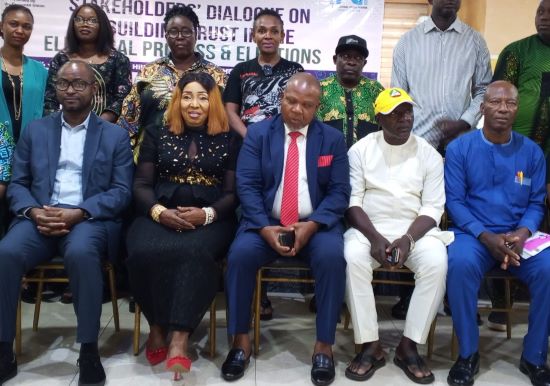The Independent National Electoral Commission has offered the reason why it has not conducted a by-election for Anambra South Senatorial District to replace Senator Ifeanyi Ubah.
Dr. Elizabeth Agu, the Resident Electoral Commissioner in Anambra State, said this at a stakeholders’ dialogue in Awka on Thursday.
The dialogue, organised by the International Press Centre, had the theme: “Rebuilding Trust in the Electoral Process and Election.”
The News Agency of Nigeria reports that Senator Ubah died in July 2024.

Agu said that INEC had made preparations for the election and was ready to conduct it anytime it received a request from the Senate to fill the vacant seat.
She called on Anambra State public, especially politicians, to play by the rules as the state prepares for the November 8 governorship election, while assuring that the electoral body would ensure that people’s votes counted.
Also Read:
- Elumelu commits to boosting Gabon’s infrastructure, youth empowerment
- Polo, politics, and the Dasuki family, by Yushau A. Shuaib
- We are giving Presidential Amnesty Programme human face – Otuaro
- Akpabio, Udom end feud after nine years
- Shell exhibition delivers value as energy summit ends in Abuja
“INEC is ready for the Anambra South Senatorial District by-election, but the Senate has to write to us to request for the replacement of the vacant seat before we can conduct the election,” she said.
In his keynote lecture, Dr. Nkwachukwu Orji, a lecturer at the University of Nigeria Nsukka, said that public trust was crucial to participatory and successful election.
Nkwachukwu, a former REC in the state, said voter apathy was an indication that there were things that were wrong in the electoral process, including high trust deficit.
The don said though INEC had the constitutional rights to supervise the electoral process, it had allowed other members of the society to be part of the process with the aim of boosting public trust.
He said that trust issues in elections could be as a result of competence or integrity.
According to him, trust is a process that goes up or down and is affected by fraud and irregularities, unprofessional conduct of officials, poor legal framework, partisan bias and others.
“This is why INEC has transferred the announcement of the result to Vice Chancellors ,” he said.
The Chairman of the programme, Dr. Emeka Ononamadu, said the election process required an interplay of multiple collaborating stakeholders, who must work effectively for a credible outcome.
Ononamadu, a former REC in Enugu State and Convener of Nigeria Democracy Clinic, said the stakeholders were the civil society, security agencies and the general public, all of whom should play roles well.
He said another challenge to the election process in Nigeria was the role of political prophets who predicted outcomes putting the electorate and the umpire under unnecessary pressure.
In an address of welcome, Lanre Arogundade, Executive Director, International Press Centre, said the large turnout indicated their dedication and commitment to enhancing the electoral system.
Arogundade, who was represented by Stella Nwofia, Programme Manager at IPC, promised that recommendations from the dialogue would be shared with relevant authorities for enhancement of the democratic processes.
He said: “Our aim is to gather insights from all geopolitical zones in Nigeria, focusing on the urgent need to rebuild trust and foster collaboration that will improve future elections especially following the complexities that arose during the 2023 general election.
“Together, we can spark meaningful change and restore integrity to our elections. The road ahead may be challenging, but with collective effort and determination, we can make a difference.”


